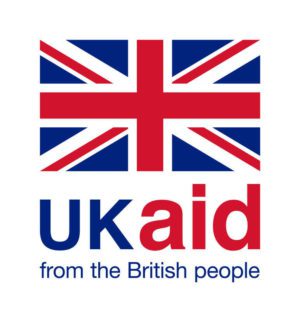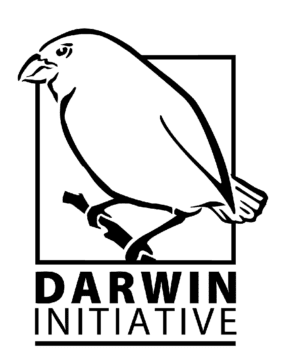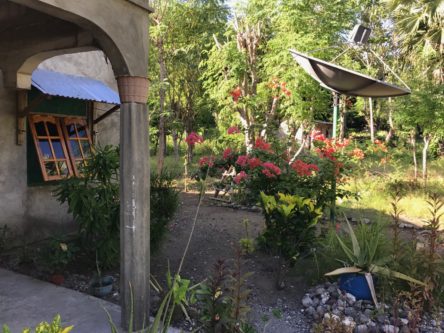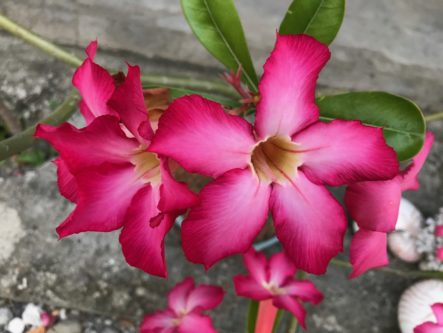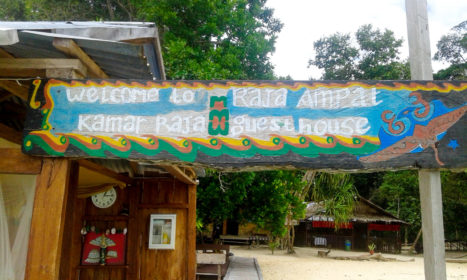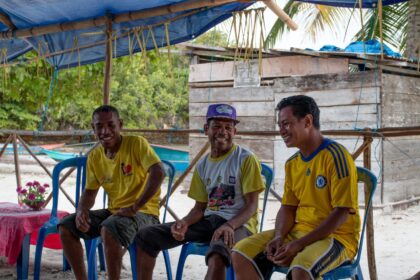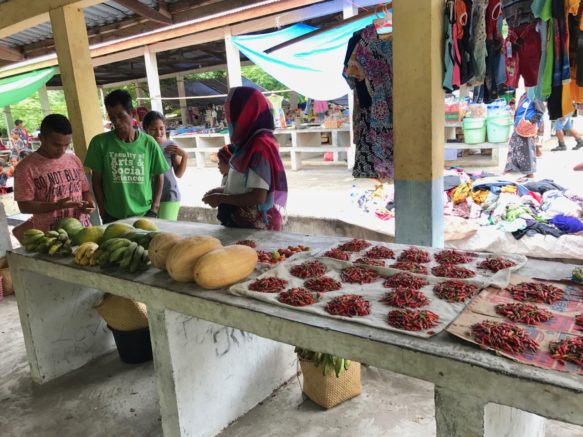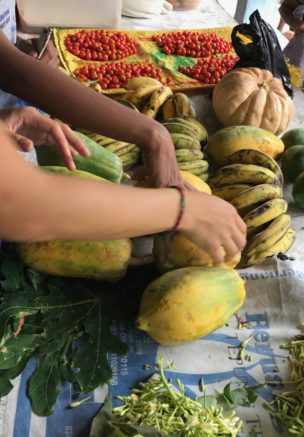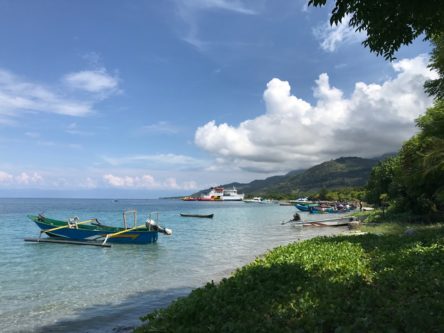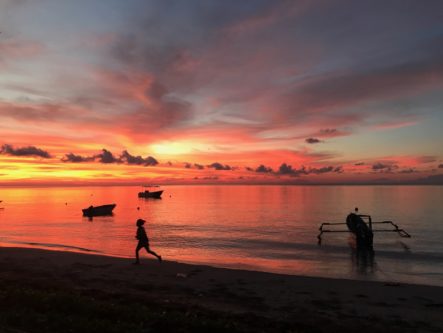The sun has just set in Beloi Village on Ataúro Island as Alda Soares places dishes brimming with seasonal vegetables and rice on her dining table. When the last plate is set, she stands next to her husband Afonso who says a prayer of gratitude for their meal. He also gives thanks for the wellbeing of the guests at their table—marine conservation volunteers with Blue Ventures who returned safely after a day exploring the sea. The Soares family is part of the Ataúro Homestay Association (AHA), a group that has opened their homes to visitors in an effort to generate a new income stream for a community in the midst of change.
Ataúro is a small island in Timor-Leste that is home to about 8,000 people. Traditionally, its communities subsisted on farming and fishing. But recent generations have seen a decline in the island’s rich resources due to increasing population, overfishing, climate change and other pressures. As a result, they are seeking ways to manage their resources and establish new livelihoods. And Blue Ventures is working with them to achieve these goals.
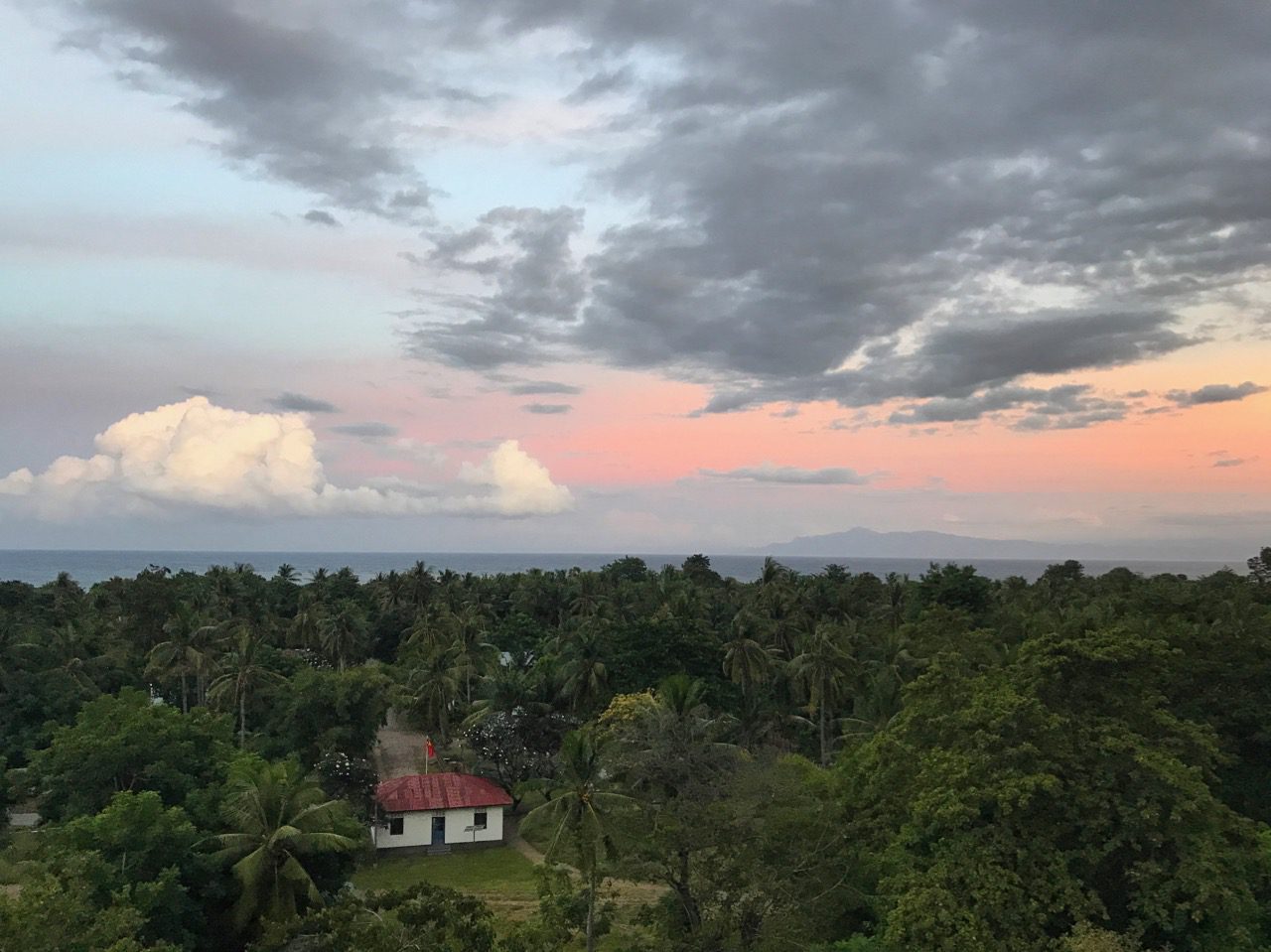
Beloi Vilage from above | Photo: Christina Saylor
Families organise to meet a new demand in the market
Blue Ventures’ volunteer expeditions run in six-week intervals. Volunteers help collect data that inform conservation activities and work with the community in various capacities as well. The volunteers pay an expedition fee, which includes the cost of accommodations and food during their stay.
Blue Ventures launched expeditions on Ataúro in 2016. At the time, a handful of accommodations existed, catering to weekenders from Timor-Leste’s capital Dili and a small number of off-the-beaten-path tourists drawn by the island’s expansive coral reefs and trek-worthy hills. More housing options were needed for volunteers.
“Helping establish the homestay association on Ataúro aligned with Blue Ventures’ communities first approach because it enabled the community to create an alternative livelihood. It was a big change and it wasn’t easy, but now families are seeing they can earn an income by hosting visitors. The community is directly benefiting from the volunteer tourism that Blue Ventures is bringing to the island.”
– Oldegar Massinga, Blue Ventures’ Community Conservation Coordinator
When the Blue Ventures’ team approached the community in Beloi about initiating a homestay programme, they found a group of families who were ready to embrace the opportunity. But creating a successful homestay programme requires more than rolling out a cot and serving breakfast. The families needed some assistance getting started.
Blue Ventures helped by providing start-up loans for home renovations or enhancements and organised a specialised training session in Indonesia with representatives of the longstanding and highly successful Raja Ampat Homestay Association. The Beloi families learned how those communities set up their homes to accommodate guests, how they communicate with visitors, how they market themselves, etc.
Each family in Beloi also completed a hospitality certification programme with the Timor-Leste Ministry of Tourism. It was hard work, but they moved forward with commitment. Eight AHA families now house volunteers for 2-3 weeks within each expedition, and tourists from other sources have begun finding their way to Beloi as well.
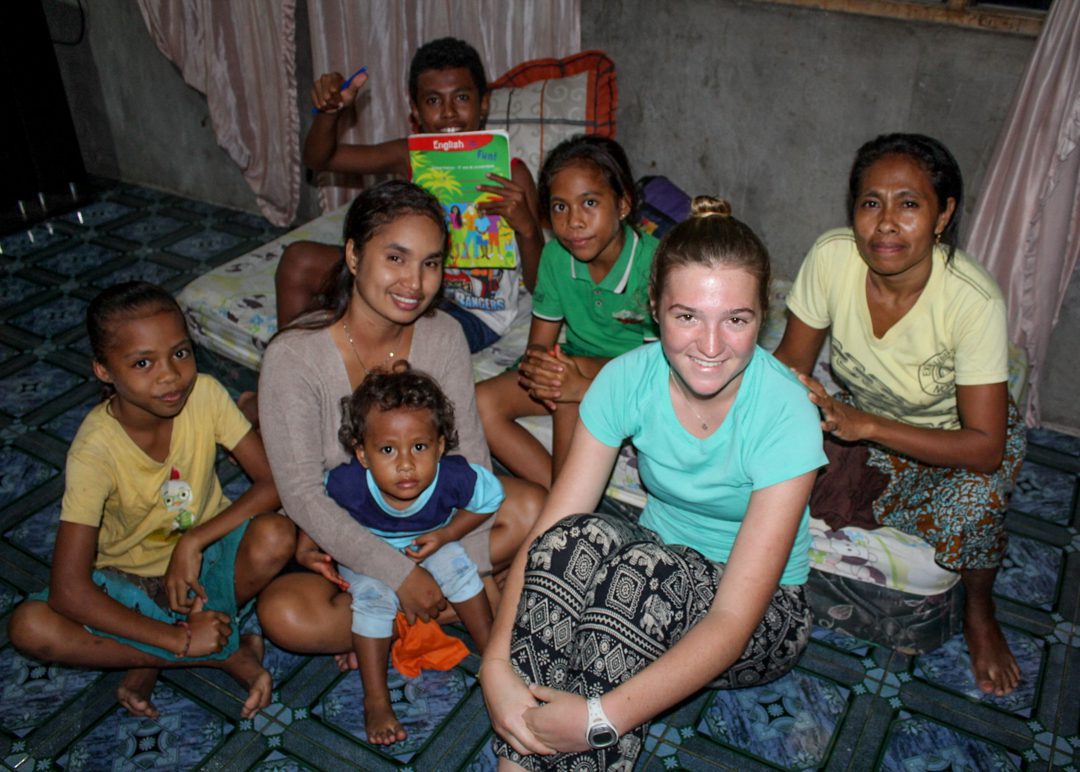
Volunteer Mackenzie with her homestay family | Photo: Mackenzie Burke
Beyond accommodation: homestays offer a cultural exchange
The conversation during dinner at Afonso and Alda’s house unfolds in a combination of English and the Timorese dialect Tetun. Each volunteer has received basic Tetun lessons, and each homestay family has a Tetun-English word-finder to help hosts and guests communicate.
Nearly every conversation begins with “Diak ka lae?” or “How are you?” And the answer is always, “Hau diak! Ita?” or “I am good! You?”
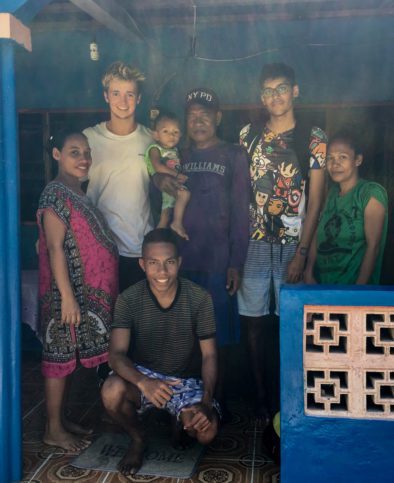
Blue Ventures volunteers with their homestay family | Photo: Sam Webster
Occasionally there is a gaffe that makes everyone laugh. For example, Hanne, their guest from the U.K. sits at the table and says, “Hau kapaas!” Ever polite, Afonso only nods, until Hanne’s fellow volunteer points out, “You just declared that you are beautiful.” Hanne blushes and explains she meant to say “Hau hamlaha” or “I am hungry.”
As they eat, Afonso and Alda ask a series of questions…
What does your father do for work? How many people are in your family? Is your brother married? Does he have children? What church do you attend?
These are the “getting-to-know-you” questions within the culture of Ataúro, where life is focused on family and faith.
Afonso is a coach at the local high school, and he is one of several ministers at the Protestant church, which is a hub of village activity every Sunday. Alda, with her oldest daughter’s help, manages the household and meals for her family of five and their two guests.
On some nights after dinner, the family sits together to watch TV. On others, Afonso attends meetings at the church and Alda sits with her mother weaving traditional baskets that are used to clean and sort grains. She responds warmly as one of her guests asks about their use and takes a moment to learn the English words for weaving and basket.
Their youngest daughter, Elisabeth, who is both curious and shy, occasionally slips onto the front porch with a pad of paper and colored pencils. She colors pictures that the volunteers draw, and in turn, helps her guests learn the Tetun words for each shape.
These cultural and language exchanges are important to both the guests and the hosts. Another homestay host and fisherman Estevao Marques says he enjoys practicing his English with guests and he encourages his children to learn English from them as well. Estevao’s wife Lourdes has hosted several volunteers who are curious about Timorese cooking. She has fun with guests in the kitchen and sees that they like trying local foods like banana flower or papaya flower.
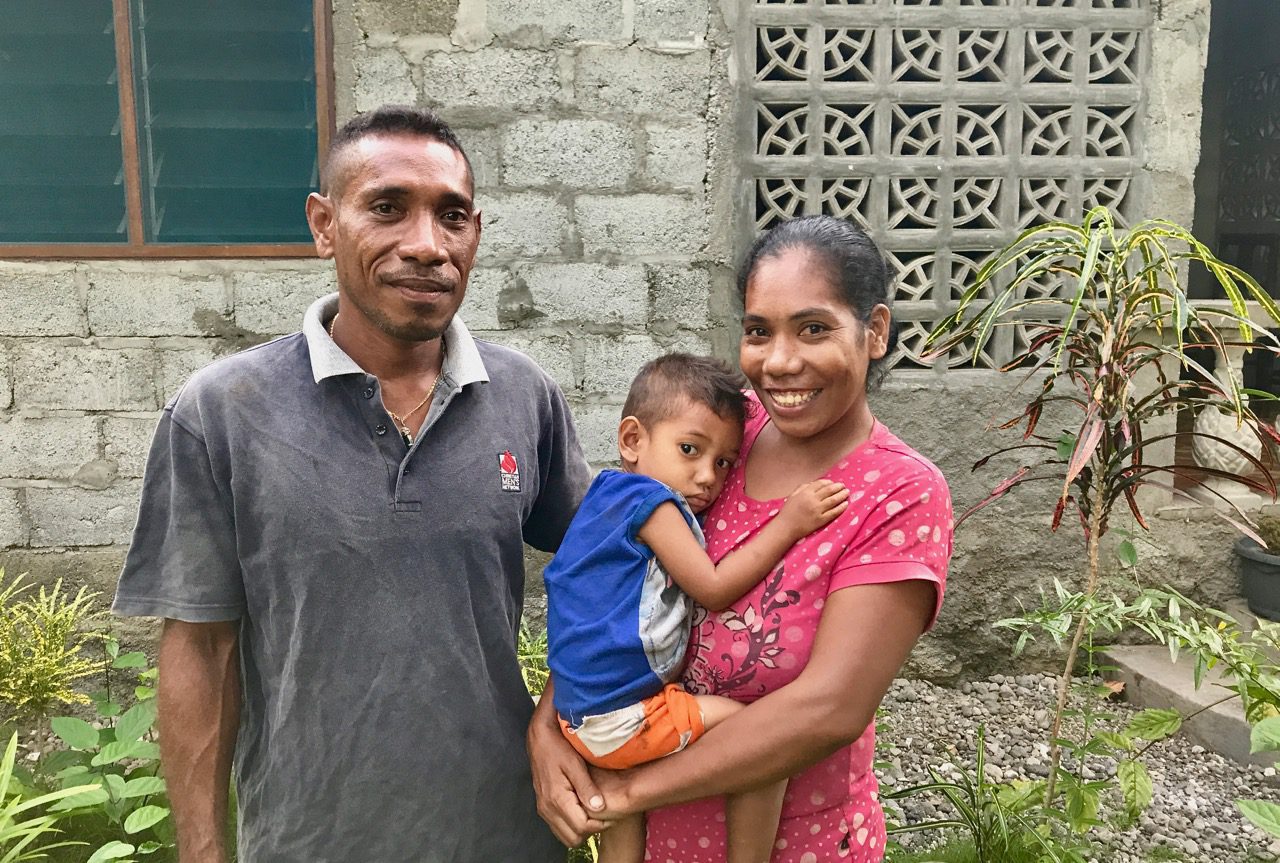
Homestay hosts Estevao and Lourdes Marques | Photo: Christina Saylor
The village and beyond: an investment in the future
Estevao is happy with the decision he made to be part of the AHA.
“Being a homestay host is a good job. It requires less work than being a fisherman and has opportunities for growth in the future,” he says. “Homestays also benefit the entire community of Beloi as well as other villages, not just the host families. For example, we use part of our income to buy fruits and vegetables for the guests to eat. This brings income to other community members and other communities.”
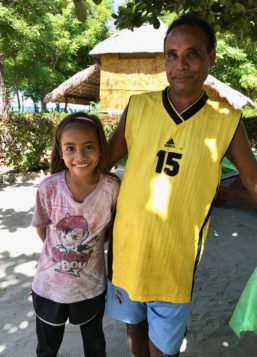
Homestay host Moises Alves with his daughter | Photo: Christina Saylor
Host Moises Alves agrees that homestays are good for the community and the economy. He also sees the long-term benefits of the enterprise noting, as one example, that his homestay income is helping support his children’s future by providing money for school.
Both hope to see the association’s business grow in the future. A few tourists who are not with Blue Ventures have found their way to Beloi through word-of-mouth, and the association is working on developing marketing tactics.
For now, Moises says, “I hope that Blue Ventures’ volunteers go home and tell their friends about their experience on Ataúro and what they learned while staying with a family in Beloi.”
For many volunteers, the warm welcome they receive in Beloi is a unique experience not only to be talked about but also long-remembered. Their integration into the community offers a cultural experience that would be impossible to replicate in a hotel or guesthouse. And it helps them understand the needs of the community that relies on the marine environment they are working to conserve.
Experience Beloi hospitality for yourself as a marine conservation volunteer!
A fisherman’s journey into deeper seas: a blog about scuba diving and conservation in Timor-Leste.
Find out more about the Atauro Homestay Association
Blue Ventures would like to thank our supporters and funders including the Darwin Initiative through UK Government funding, the GEF through UNEP under the Dugong and Seagrass Project, and Wilstar.
